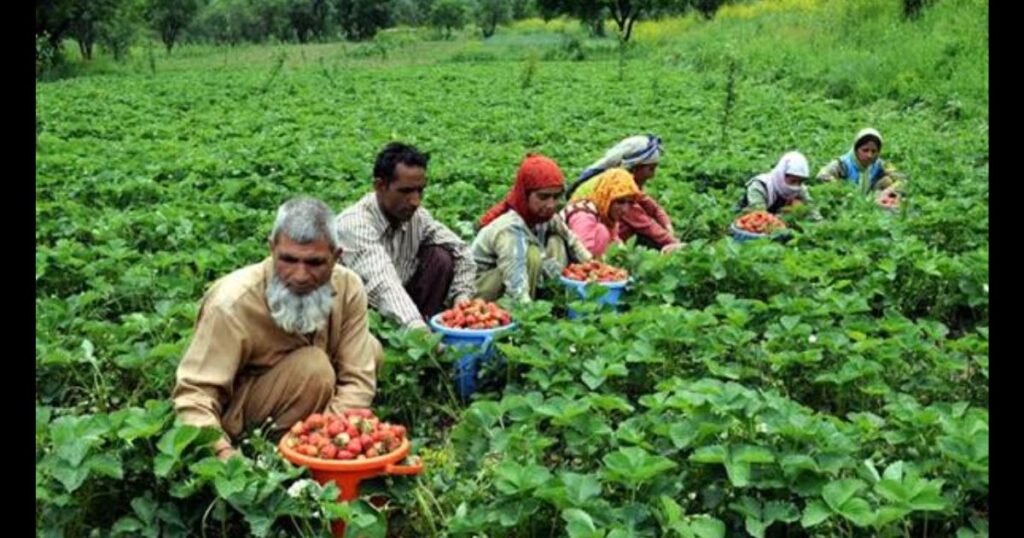New Delhi – To revolutionize the agricultural sector in Jammu and Kashmir, Indian Prime Minister Narendra Modi has launched a US$217.2 million programme. This ambitious initiative, known as the “Competitiveness Improvement of Agriculture and Allied Sectors Project in Jammu and Kashmir (JKCIP),” is a collaborative effort between the United Nations’ International Fund for Agricultural Development (IFAD) and the Government of Jammu and Kashmir (GoJ&K). The project aims to enhance the competitiveness and climate resilience of small-scale farmers, ultimately boosting incomes and improving the livelihoods of rural communities.
Transforming Agriculture: The Vision of JKCIP
JKCIP is set to impact 300,000 families and 1.5 million people across all 20 districts of Jammu and Kashmir. The project will promote the adoption of climate-smart and market-led agricultural practices, encouraging farmers to diversify into high-value crops that are best suited to the region’s climate. This initiative will also expand the cultivation of niche and horticulture crops, significantly improving the region’s agricultural productivity.
“This project is a unique opportunity to transform agriculture in Jammu and Kashmir,” said Ulaç Demirag, IFAD Country Director and Representative in India. “By prioritizing climate-smart practices, fostering innovation, sustainability, and empowering rural communities, this investment can help create a more prosperous, inclusive, and resilient future for the region.”
ALSO READ: From Orphanage to IAS: B. Abdul Nasar’s Inspiring Journey in Civil Service
Addressing Long-Standing Challenges
The JKCIP is designed to align with the GoJ&K’s ambitious Holistic Agriculture Development Programme, aiming to unlock the vast agricultural potential of Jammu and Kashmir. Historically, the region’s agricultural growth has been hindered by several challenges, including:
- Remoteness: The geographical isolation of many farming communities.
- Limited Connectivity: Inadequate infrastructure connecting farms to markets.
- Poor Agricultural Management Practices: Outdated farming methods and lack of modern techniques.
- Low Investment in the Value Chain: Insufficient financial support and resources for farmers.
- Limited Livelihood Diversification: Few opportunities for farmers to diversify their income sources.
JKCIP will address these constraints by fostering the development of viable and inclusive farmer producer organizations, enhancing the productivity and production of niche and horticultural crops, enabling farmers to obtain better prices, and improving the resilience of vulnerable groups.
Boosting the Agribusiness Ecosystem
A key component of JKCIP is the development of the agribusiness ecosystem in Jammu and Kashmir. The project will stimulate the growth of agri-enterprises and start-ups, with a particular focus on those led by young women entrepreneurs. This will help build new markets and connect farmers to them, providing substantial support to vulnerable communities. Additionally, the project will improve animal breeding practices and ensure better prices for wool, creating new income opportunities and contributing to a more inclusive rural economy.
ALSO READ: From Tea Seller To IAS Officer: The Inspiring Journey Of Himanshu Gupta
Funding and Financial Support
The funding for JKCIP is sourced from multiple contributors:
- IFAD: US$100 million, with US$50.77 million dedicated to climate action.
- Government of Jammu and Kashmir: US$26.4 million.
- Private Banks: US$20.8 million.
- Private Sector: US$20.7 million.
- Project Participants: US$45.8 million from their own funds.
IFAD’s Commitment to India
India is one of the founding members of IFAD. The current Country Strategic Opportunities Programme for India is fully aligned with the government’s policy framework, focusing on ensuring that smallholder food and agricultural production systems are remunerative, sustainable, and resilient to climate change and price shocks. To date, IFAD has supported 34 rural development projects in India worth US$1,364.58 million, directly benefiting over 6.3 million families.
Looking Ahead
The launch of JKCIP marks a significant step towards achieving a more prosperous and resilient agricultural sector in Jammu and Kashmir. By focusing on climate-smart practices, innovation, and inclusivity, this project is poised to transform the lives of rural communities, paving the way for a sustainable and prosperous future for the region.
For ongoing updates and detailed insights into the progress of this groundbreaking initiative, stay connected with our platform.


